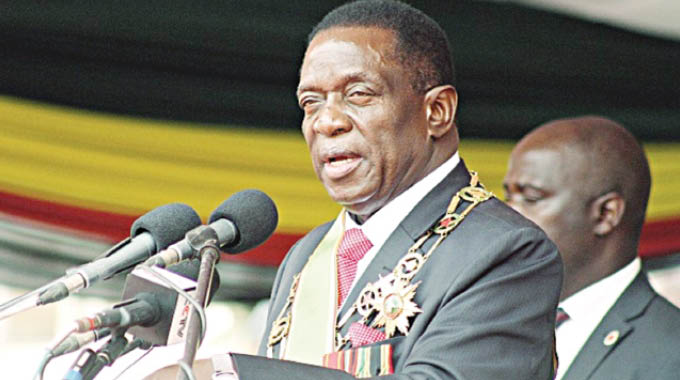EDITORIAL COMMENT: Mopa will make conveners of protests think twice before unleashing mayhem

The Public Order and Security Act (Posa) was one of the country’s most contested pieces of legislation.
Opposition parties didn’t like it, saying it curtailed a number of freedoms in contravention of the Constitution. They complained that the law made it difficult for them to exercise their freedoms of assembly, association and expression.
Posa was enacted in 2002, repealing the Law and Order Maintenance Act, a draconian statute that was also colonial, thus was used by successive white regimes to frustrate blacks in their fight for Independence.
As the Government forges ahead on its path to reform, Posa was repealed on Friday, the day when its successor, Maintenance of Peace and Order (Mopa) was gazetted.
President Mnangagwa, speaking at an anti-sanctions rally at Mahusekwa in Mashonaland East on Saturday, said he had signed Mopa into law. “We now have a new law. We have removed Posa and it has been replaced by what we call Mopa. I signed Mopa into law just last week,” he said.
Repealing Posa was an important step by the Government showing its determination to come up with laws that deepen people’s freedoms in line with the Constitution.
Mopa is indeed a new law, substantially different from its predecessor in a number of ways. One of its positive provisions is under Clause 8 (Consultations, Negotiation, Amendment of Notices and Conditions with Respect to Gatherings to avoid Public Disorder). Under that sub-clause (1) a senior police officer is now bound to notify the convener of a public demonstration within three days of receiving the notice on the proposed demonstration. If the police officer has no objections that this will not cause any disruption or disorder, approval will be given.
We say this is a positive change because under section 26 of Posa no time-limit was specified under which the senior police officer was to respond to a convener of a public demonstration. In terms of the old law, conveners could be kept in the dark until the last minute before being told about the position of the police. Critics argued that the vagueness in the old law was open to abuse as law enforcement agencies could just remain quiet about a convener of a public demonstration’s application for permission to march.
Even if the conveners of the processions approached the courts, the police could not be ordered to respond to the application to demonstrate because there was no specific provision that bound them to have done so within any period of time.
Another provision that we think is positive is under Clause 18 (When Defence Forces May Assist Police Service under this Act).
This clause seeks to realign section 37 of Posa by ensuring that the President, not the Minister of Defence, authorises the deployment of soldiers to assist the police in maintaining law and order, as required by section 213 of the Constitution. In terms of Sub-clause (3) the President is obliged to inform Parliament within seven days after deploying the defence forces, in accordance with section 214 of the Constitution.
There are many other changes to the old law that the opposition and civil society — the two most strident critics of Posa — would find encouraging. We have been watching with interest the efforts by the Government to open up democratic space and hold the repeal of Posa and enactment of Mopa as a message that the Second Republic has no motivation whatsoever to hamper legitimate protests. Actually through Mopa, and more new laws on the way among them media laws, the Government wants the people of this country, whether they are supporters of the ruling party or its opponents, to feel free and safe to criticise and protest, as long as such criticism and protests are within the precepts of the law.
Having said that, it is important to emphasise that the right to criticise or demonstrate, like all other rights, is not absolute.
Clause 12 (Civil Liability in Certain Circumstance of Convener of a Gathering) says that if a demonstration is held without following the laid-out procedures the convener will be held liable for any damages or injuries caused. The aggrieved persons can seek compensation or other forms of redress through the courts of law.
We remember that early this year, the opposition staged demonstrations that turned into an orgy of arson and looting. Scores of businesses in Harare, Bulawayo, Chitungwiza and elsewhere were looted and burned. To this day, a number of the businesses remain closed with owners out of pocket to rebuild their properties or to restock. However, some of them benefited from a $19,5 million fund set up by the Government to assist them to start all over again.
That was a responsible gesture by authorities but one that was not supposed to be the case because the taxpayer did not send opposition activists to loot and burn and as such, was not supposed to bear the cost of the destruction. Instead, the conveners of the protests were supposed to be held liable. Mopa makes that clear now. Therefore, in future, if, for example, MDC Alliance or the Zimbabwe Congress of Trade Unions organise a march that ends in looting and arson, they would be legally bound to pay compensation to owners of properties that would have been destroyed. That is only fair.
We see Mopa as a good piece of legislation that, on one hand entrenches people’s freedoms in terms of the Constitution while on the other, ensures that such freedoms are exercised responsibly.












Comments